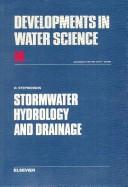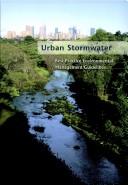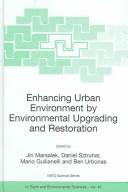| Listing 1 - 10 of 11 | << page >> |
Sort by
|
Book
ISBN: 9241544163 Year: 1991 Publisher: Geneva WHO
Abstract | Keywords | Export | Availability | Bookmark
 Loading...
Loading...Choose an application
- Reference Manager
- EndNote
- RefWorks (Direct export to RefWorks)
Storm sewers --- -Urban hydrology --- -628.1/.3 --- 628.222 --- (100-77) --- $?$91/02 --- Hydrology --- Sewers, Storm --- Storm drainage systems --- Storm drains --- Surface water sewers --- Drainage --- Runoff --- Sewerage --- Urban runoff --- Health aspects --- Developing countries --- Urban hydrology --- 628.1/.3

ISBN: 0444419985 9786611778057 1281778052 0080870058 9780444419989 9780080870052 9781281778055 6611778055 Year: 1981 Publisher: Amsterdam ; New York : New York : Elsevier Scientific Pub. Co. ; Distributors for the U.S. and Canada, Elsevier/North Holland,
Abstract | Keywords | Export | Availability | Bookmark
 Loading...
Loading...Choose an application
- Reference Manager
- EndNote
- RefWorks (Direct export to RefWorks)
Stormwater Hydrology and Drainage
Storm sewers. --- Urban hydrology. --- Urban runoff. --- Sewers, Storm --- Storm drainage systems --- Storm drains --- Surface water sewers --- Drainage --- Runoff --- Sewerage --- Urban runoff --- Urban snowmelt runoff --- Urban stormwater runoff --- Sewage --- Urban hydrology --- Hydrology --- Drainage. --- Rain and rainfall. --- Storm sewers
Book
ISBN: 0918334489 Year: 1982 Publisher: Littleton Water resources publications
Abstract | Keywords | Export | Availability | Bookmark
 Loading...
Loading...Choose an application
- Reference Manager
- EndNote
- RefWorks (Direct export to RefWorks)
Storm sewers --- Urban runoff --- Egouts pluviaux --- Ecoulement urbain --- Congresses --- Congrès --- -Urban runoff --- -628.3 --- Urban snowmelt runoff --- Urban stormwater runoff --- Runoff --- Sewage --- Urban hydrology --- Sewers, Storm --- Storm drainage systems --- Storm drains --- Surface water sewers --- Drainage --- Sewerage --- Sewage. Surface and foul water. Properties and treatment. Sewage works --- 628.3 Sewage. Surface and foul water. Properties and treatment. Sewage works --- Congrès --- 628.3

ISBN: 1283156393 9786613156396 0643100598 0643093508 9780643093508 9780643100596 0643064532 9780643064539 Year: 1999 Publisher: Collingwood, Vic. : CSIRO Pub.,
Abstract | Keywords | Export | Availability | Bookmark
 Loading...
Loading...Choose an application
- Reference Manager
- EndNote
- RefWorks (Direct export to RefWorks)
These guidelines have been designed to meet the needs of people involved in the planning, design or management of urban land uses or stormwater drainage systems.
Urban runoff --- Storm sewers --- Water quality management --- Water --- Sewage disposal --- Sewage --- Domestic effluent --- Domestic sewage --- Domestic wastewater --- Effluent (Sewage) --- Industrial effluent --- Industrial wastewater --- Sewage effluent --- Waste water --- Waste waters --- Wastewater --- Wastewaters --- Sewerage --- Waste disposal --- Refuse and refuse disposal --- Hydrology --- Water quality --- Water quality control --- Management --- Water conservation --- Water-supply --- Sewers, Storm --- Storm drainage systems --- Storm drains --- Surface water sewers --- Drainage --- Runoff --- Urban snowmelt runoff --- Urban stormwater runoff --- Urban hydrology --- Management. --- Pollution --- Environmental aspects
Book
ISBN: 9170321280 Year: 1984 Publisher: Goteborg Chalmers University of Technology. Urban Geohydrology research Group
Abstract | Keywords | Export | Availability | Bookmark
 Loading...
Loading...Choose an application
- Reference Manager
- EndNote
- RefWorks (Direct export to RefWorks)
Congrès- Urban storm drainage --- 628.21 --- 711.8 --- 628.258 --- Storm sewers --- -City planning --- Cities and towns --- City planning --- Civic planning --- Land use, Urban --- Model cities --- Redevelopment, Urban --- Slum clearance --- Town planning --- Urban design --- Urban development --- Urban planning --- Land use --- Planning --- Art, Municipal --- Civic improvement --- Regional planning --- Urban policy --- Urban renewal --- Sewers, Storm --- Storm drainage systems --- Storm drains --- Surface water sewers --- Drainage --- Runoff --- Sewerage --- Urban runoff --- Sewerage systems --- Planologie: openbare nutsvoorzieningen --- Overflows and regulators. Storm overflows (separation weirs) etc. --- Congresses --- Government policy --- Management --- Conferences - Meetings --- 628.258 Overflows and regulators. Storm overflows (separation weirs) etc. --- 711.8 Planologie: openbare nutsvoorzieningen --- 628.21 Sewerage systems --- Congrès- Urban storm drainage
Book
ISBN: 1489994017 1461446236 1461446244 Year: 2013 Publisher: New York ; London : Springer,
Abstract | Keywords | Export | Availability | Bookmark
 Loading...
Loading...Choose an application
- Reference Manager
- EndNote
- RefWorks (Direct export to RefWorks)
Optimizing Stormwater Treatment Practices: A Handbook of Assessment and Maintenance provides the information necessary for developing and operating an effective maintenance program for stormwater treatment. The book offers instructions on how to measure the level of performance of stormwater treatment practices directly and bases proposed maintenance schedules on actual performance and historical maintenance efforts and costs. The inspection methods, which are proven in the field and have been implemented successfully, are necessary as regulatory agencies are demanding evaluations of the performance of stormwater treatment practices. The authors have developed a three-tiered approach that offers readers a standard protocol for how to determine the effectiveness of stormwater treatment practices currently in place. This book also: Provides a standard protocol for how to determine the effectiveness of stormwater treatment practices Assists readers with identifying which assessment techniques to use for stormwater treatment while also providing instructions on implementation methods Contains a substantial number of examples and case studies to illustrate the use of the methods discussed in the book Optimizing Stormwater Treatment Practices: A Handbook of Assessment and Maintenance is an ideal reference and handbook for stormwater professionals. .
Civil engineering. --- Engineering. --- Environmental pollution. --- Engineering & Applied Sciences --- Engineering - General --- Urban runoff --- Storm sewers. --- Management. --- Sewers, Storm --- Storm drainage systems --- Storm drains --- Surface water sewers --- Stormwater management, Urban --- Water quality. --- Water pollution. --- Civil Engineering. --- Water Quality/Water Pollution. --- Waste Water Technology / Water Pollution Control / Water Management / Aquatic Pollution. --- Environmental Monitoring/Analysis. --- Rain gardens --- Drainage --- Runoff --- Sewerage --- Monitoring/Environmental Analysis. --- Chemical pollution --- Chemicals --- Contamination of environment --- Environmental pollution --- Pollution --- Contamination (Technology) --- Asbestos abatement --- Bioremediation --- Environmental engineering --- Environmental quality --- Factory and trade waste --- Hazardous waste site remediation --- Hazardous wastes --- In situ remediation --- Lead abatement --- Pollutants --- Refuse and refuse disposal --- Engineering --- Public works --- Environmental aspects --- Environmental monitoring. --- Biomonitoring (Ecology) --- Ecological monitoring --- Monitoring, Environmental --- Applied ecology --- Aquatic pollution --- Fresh water --- Fresh water pollution --- Freshwater pollution --- Inland water pollution --- Lake pollution --- Lakes --- Reservoirs --- River pollution --- Rivers --- Stream pollution --- Water contamination --- Water pollutants --- Water pollution --- Waste disposal in rivers, lakes, etc. --- Freshwater --- Freshwater quality --- Marine water quality --- Quality of water --- Seawater --- Seawater quality --- Water --- Measurement --- Monitoring --- Quality --- Composition

ISBN: 1402026927 1402026935 9786610191161 1280191163 1402026943 1402019823 9786610460656 1280460652 1402023073 1402019831 Year: 2004 Volume: 43 Publisher: Dordrecht ; Boston : Kluwer Academic Publishers,
Abstract | Keywords | Export | Availability | Bookmark
 Loading...
Loading...Choose an application
- Reference Manager
- EndNote
- RefWorks (Direct export to RefWorks)
As urban areas keep growing, water infrastructure ages, and the requirements on environmental protection become more rigorous, there is a continual need for upgrading water pollution control facilities and restoring degraded urban waters. Such issues are addressed in this book by focusing on five major topics: (a) Upgrading stormwater management facilities, (b) Retrofitting / upgrading combined sewer overflow (CSO) facilities, (c) Optimising/upgrading sewage treatment plant performance, (d) Urban stream restoration, and (e) Challenges in restoring urban environment. Each chapter contains some overview papers followed by research or case study papers. Besides presentations of new approaches and accomplishments in the field of upgrading and restoration, several papers provide analysis of vast needs in this field in several countries of Central and Eastern Europe, which either recently joined the European Union (EU) or are preparing for accession, and need to comply with the existing EU directives dealing with environmental protection. As such, this book will be of primary interest to researchers and university lecturers dealing with environmental upgrading and restoration, environmental planners from all levels of government, municipal engineers and politicians, and finally the private industry representatives (consultants, private utilities and environmental technology suppliers) searching for new business opportunities among the new or aspiring members of EU.
Urban runoff. --- Urban runoff --- Storm sewers --- Water-supply --- Water use --- Stream restoration --- Environmental Sciences --- Environmental Engineering --- Earth & Environmental Sciences --- Civil & Environmental Engineering --- Engineering & Applied Sciences --- Environmental aspects --- Rehabilitation, River --- Rehabilitation, Stream --- Restoration of rivers --- Restoration of streams --- River rehabilitation --- River restoration --- Stream rehabilitation --- Rivers --- Use of water --- Utilization of water --- Water --- Water utilization --- Sewers, Storm --- Storm drainage systems --- Storm drains --- Surface water sewers --- Urban snowmelt runoff --- Urban stormwater runoff --- Restoration --- Utilization --- Ecoulement urbain --- Egouts pluviaux --- Eaux --- Réhabilitation --- Commutative algebra - Congresses. --- Algèbres commutatives --- Computational noncommutative algebra --- Réhabilitation --- EPUB-LIV-FT LIVECOLO SPRINGER-B Urban environment --- Eau --- Cours d'eau --- Congresses. --- Congrès --- Approvisionnement --- Aspect de l'environnement --- Utilisation --- Commutative algebra --- Congresses --- Restoration ecology --- Drainage --- Runoff --- Sewerage --- Sewage --- Urban hydrology --- Regulation --- Algebra. --- Algebraic geometry. --- Algebraic Geometry. --- Algebraic geometry --- Geometry --- Mathematics --- Mathematical analysis
Book
ISBN: 9783038420910 Year: 2015 Publisher: [Basel, Switzerland] : MDPI - Multidisciplinary Digital Publishing Institute,
Abstract | Keywords | Export | Availability | Bookmark
 Loading...
Loading...Choose an application
- Reference Manager
- EndNote
- RefWorks (Direct export to RefWorks)
This book on Sustainable Drainage Systems disseminates recent findings on current challenges faced by practicing sustainable drainage engineers and scientists.
Drainage --- Runoff --- Flood control --- Storm sewers --- Hydraulic engineering --- Sustainable development. --- Environmental aspects. --- Management --- Development, Sustainable --- Ecologically sustainable development --- Economic development, Sustainable --- Economic sustainability --- ESD (Ecologically sustainable development) --- Smart growth --- Sustainable development --- Sustainable economic development --- Economic development --- Engineering, Hydraulic --- Engineering --- Fluid mechanics --- Hydraulics --- Shore protection --- Sewers, Storm --- Storm drainage systems --- Storm drains --- Surface water sewers --- Sewerage --- Urban runoff --- Flood prevention --- Flood protection --- Floods --- Prevention of floods --- Rivers --- Forest influences --- Flowoff --- Melt runoff --- Meltwater runoff --- Rainfall runoff --- Run-off --- Snow cover runoff --- Snow dump runoff --- Snow melt runoff --- Snowmelt-induced runoff --- Snowmelt runoff --- Snowmelt water runoff --- Storm runoff --- Storm water runoff --- Stormwater runoff --- Water runoff, Snowmelt --- Water runoff, Storm --- Hydrologic cycle --- Land drainage --- Agricultural engineering --- Reclamation of land --- Sanitary engineering --- Environmental aspects --- Prevention --- Regulation
Book
Year: 2021 Publisher: Basel, Switzerland MDPI - Multidisciplinary Digital Publishing Institute
Abstract | Keywords | Export | Availability | Bookmark
 Loading...
Loading...Choose an application
- Reference Manager
- EndNote
- RefWorks (Direct export to RefWorks)
Different types of pressures, such as nutrients, micropollutants, microbes, nanoparticles, microplastics, or antibiotic-resistant genes, endanger the quality of water bodies. Evidence-based pollution control needs to be built on the three basic elements of water governance: Monitoring, modeling, and management. Monitoring sets the empirical basis by providing space- and time-dependent information on substance concentrations and loads, as well as driving boundary conditions for assessing water quality trends, water quality statuses, and providing necessary information for the calibration and validation of models. Modeling needs proper system understanding and helps to derive information for times and locations where no monitoring is done or possible. Possible applications are risk assessments for exceedance of quality standards, assessment of regionalized relevance of sources and pathways of pollution, effectiveness of measures, bundles of measures or policies, and assessment of future developments as scenarios or forecasts. Management relies on this information and translates it in a socioeconomic context into specific plans for implementation. Evaluation of success of management plans again includes well-defined monitoring strategies. This book provides an important overview in this context.
diffuse pollution --- field mapping --- storm drains --- Bayesian statistics --- distributed modelling --- PhosFate --- water quality --- analysis method --- chromaticity measurement --- surface fitting --- concentration of dissolved matter --- Copernicus Programme --- ACOLITE --- flooding --- quasi-real time monitoring --- inundation mapping --- suspended matter --- Spain --- cyanobacteria --- Microcystis aeruginosa --- water --- monitoring --- spectrophotometry --- derivative absorbance --- model evaluation --- nitrogen --- nutrient retention --- phosphorus --- sediment --- constructed wetland --- water resources management --- eutrophication --- unmanned surface vehicle --- water monitoring --- ensemble learning --- dynamic power management --- observational process ontology --- water quality monitoring --- water pollution alert --- semantic discovery --- water quality status --- sources and pathways --- land cover --- digital elevation model --- urban river --- ArcGIS --- modeling --- CSO --- urban drainage --- sewer system --- trace pollutants --- urban runoff --- concentration duration frequency curve --- MONERIS --- diffuse nutrient emission --- empirical modeling --- river basin management plan of Hungary --- effectiveness of measures --- scenarios and forecasts --- socioeconomic context --- sources and pathways of water pollution --- system understanding --- water governance --- water quality statuses and trends --- water pollution control
Book
Year: 2021 Publisher: Basel, Switzerland MDPI - Multidisciplinary Digital Publishing Institute
Abstract | Keywords | Export | Availability | Bookmark
 Loading...
Loading...Choose an application
- Reference Manager
- EndNote
- RefWorks (Direct export to RefWorks)
Different types of pressures, such as nutrients, micropollutants, microbes, nanoparticles, microplastics, or antibiotic-resistant genes, endanger the quality of water bodies. Evidence-based pollution control needs to be built on the three basic elements of water governance: Monitoring, modeling, and management. Monitoring sets the empirical basis by providing space- and time-dependent information on substance concentrations and loads, as well as driving boundary conditions for assessing water quality trends, water quality statuses, and providing necessary information for the calibration and validation of models. Modeling needs proper system understanding and helps to derive information for times and locations where no monitoring is done or possible. Possible applications are risk assessments for exceedance of quality standards, assessment of regionalized relevance of sources and pathways of pollution, effectiveness of measures, bundles of measures or policies, and assessment of future developments as scenarios or forecasts. Management relies on this information and translates it in a socioeconomic context into specific plans for implementation. Evaluation of success of management plans again includes well-defined monitoring strategies. This book provides an important overview in this context.
Research & information: general --- Environmental economics --- Pollution control --- diffuse pollution --- field mapping --- storm drains --- Bayesian statistics --- distributed modelling --- PhosFate --- water quality --- analysis method --- chromaticity measurement --- surface fitting --- concentration of dissolved matter --- Copernicus Programme --- ACOLITE --- flooding --- quasi-real time monitoring --- inundation mapping --- suspended matter --- Spain --- cyanobacteria --- Microcystis aeruginosa --- water --- monitoring --- spectrophotometry --- derivative absorbance --- model evaluation --- nitrogen --- nutrient retention --- phosphorus --- sediment --- constructed wetland --- water resources management --- eutrophication --- unmanned surface vehicle --- water monitoring --- ensemble learning --- dynamic power management --- observational process ontology --- water quality monitoring --- water pollution alert --- semantic discovery --- water quality status --- sources and pathways --- land cover --- digital elevation model --- urban river --- ArcGIS --- modeling --- CSO --- urban drainage --- sewer system --- trace pollutants --- urban runoff --- concentration duration frequency curve --- MONERIS --- diffuse nutrient emission --- empirical modeling --- river basin management plan of Hungary --- effectiveness of measures --- scenarios and forecasts --- socioeconomic context --- sources and pathways of water pollution --- system understanding --- water governance --- water quality statuses and trends --- water pollution control --- diffuse pollution --- field mapping --- storm drains --- Bayesian statistics --- distributed modelling --- PhosFate --- water quality --- analysis method --- chromaticity measurement --- surface fitting --- concentration of dissolved matter --- Copernicus Programme --- ACOLITE --- flooding --- quasi-real time monitoring --- inundation mapping --- suspended matter --- Spain --- cyanobacteria --- Microcystis aeruginosa --- water --- monitoring --- spectrophotometry --- derivative absorbance --- model evaluation --- nitrogen --- nutrient retention --- phosphorus --- sediment --- constructed wetland --- water resources management --- eutrophication --- unmanned surface vehicle --- water monitoring --- ensemble learning --- dynamic power management --- observational process ontology --- water quality monitoring --- water pollution alert --- semantic discovery --- water quality status --- sources and pathways --- land cover --- digital elevation model --- urban river --- ArcGIS --- modeling --- CSO --- urban drainage --- sewer system --- trace pollutants --- urban runoff --- concentration duration frequency curve --- MONERIS --- diffuse nutrient emission --- empirical modeling --- river basin management plan of Hungary --- effectiveness of measures --- scenarios and forecasts --- socioeconomic context --- sources and pathways of water pollution --- system understanding --- water governance --- water quality statuses and trends --- water pollution control
| Listing 1 - 10 of 11 | << page >> |
Sort by
|

 Search
Search Feedback
Feedback About UniCat
About UniCat  Help
Help News
News